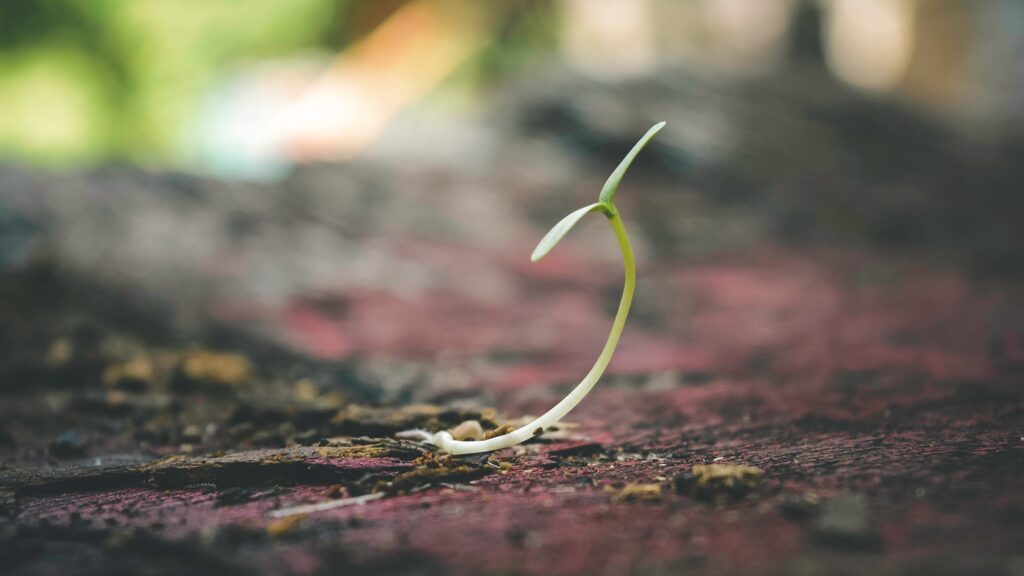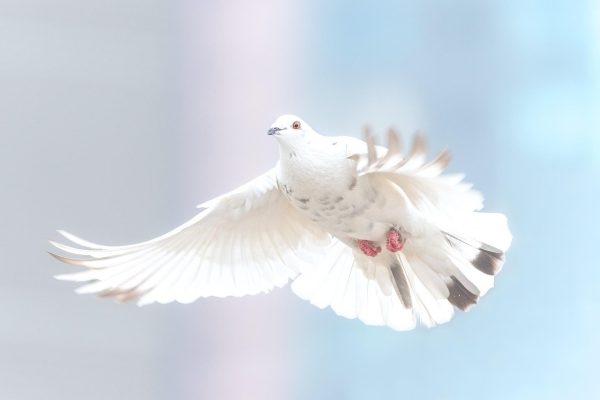Think of a place that has been sacred to you since you were a young child; find it and plan to begin your ritual there. Include among you an individual(s) who supports and nurtures you and whom you were acquainted with before your recent divorce. If possible, meet with this person(s) beforehand and ask them to be your shomer, or ritual guard, to usher in your most recent stage of life. Explain that this entails providing a physical and emotional safe place for you to express your feelings, thoughts, and experiences and a commitment to be there for you however you may need through the duration of the divorce period.
This ritual is best suited for the time period stipulated by halakhah as bein hashmashot, the period after sunset where it is difficult to decipher whether it is night or day. A single seedling should be chosen prior to the ritual by the individual who is experiencing divorce and brought to the ritual, in addition to a small patch of cloth that has been cut from the individual’s wardrobe (i.e., a small patch from a shirt or pants, etc. However, if the individual is conscious of the environment, (s)he can bring any object that belongs to her/him and is made of natural fibers). All of these items should be brought to the ritual and held onto by the shomer/ritual guard throughout.
The individual who is experiencing divorce begins by reciting the first two verses of Bereishit in Hebrew and/or English:
בְּרֵאשִׁ֖ית בָּרָ֣א אֱלֹהִ֑ים אֵ֥ת הַשָּׁמַ֖יִם וְאֵ֥ת הָאָֽרֶץ׃
וְהָאָ֗רֶץ הָיְתָ֥ה תֹ֙הוּ֙ וָבֹ֔הוּ וְחֹ֖שֶׁךְ עַל־פְּנֵ֣י תְה֑וֹם וְר֣וּחַ אֱלֹהִ֔ים מְרַחֶ֖פֶת עַל־פְּנֵ֥י הַמָּֽיִם׃
“In the beginning, G-d created the Heavens and the Earth. Now the earth was unformed and void, and darkness was upon the face of the deep; and the spirit of God hovered over the face of the waters.”
The shomer or ritual guard says the following:
“[Name of person experiencing divorce], I join with you today to move through your personal creation story and to re-covenate your heart, soul, and body as you move through this new stage of life. Biblical commentators tell us that the word bereishit means ‘in the beginning.’
The phrase occurs five times in the Hebrew Bible and is always proceeded by an intention. As you begin your life anew with divorce, I invite you to share your intention for this evening. What do you hope and hunger for? What comfort do you seek in this ritual moment?”
After the individual experiencing divorce shares their intention, the shomer or ritual guard continues:
“Just as G-d hovered over the deep and brought about the creation and eventual destruction and re-creation of the world, so will you travel through the living waters of your past in order to redeem your sacred present. Divorce, though painful, is but a moment in time, a rushing of the tide and a passing cycle of the world. You are not divorce. You are made in the image of G-d and capable of anything. As Rav Nachman teaches, ‘If you believe in breaking, you must also believe in fixing.’ But you are not what happened to you. You, a person of strength and experience, are living and are whole.
As we enter into the creation of the Ever Living G-d, I call on you to trace your marital beginnings to your most recent situation. Imagine as we walk into the outdoors: In the beginning, what did it feel like to be married? As I went through marriage, how did that change? Where do I find myself spiritually and physically in the hour of my divorce? Contemplate these questions silently as you walk through the murky waters of the deep.”
The shomer/ritual guide leads the individual who is experiencing divorce to an outdoor area where the ritual objects have been placed. Once they arrive, the shomer continues:
“Jewish mourning is traditionally accompanied by the tearing of clothes. I ask you now, [insert first name of person experiencing divorce] to say the name of the person with whom you are experiencing divorce and to tear this cloth to represent the symbolic breaking of your union. Please recite the words Barukh Dayan Ha’Emet—Blessed is the True Judge—and speak her/his name aloud and tear the garment.”
The individual experiencing divorce says the name of their ex-partner and tears the fabric.
“I invite you now to take as much time as you need to describe your feelings toward the end of your marriage and where you find yourself emotionally and spiritually in this current and transitional moment.”
When finished, the individual experiencing divorce recites in Hebrew and/or English:
וַיֹּאמֶר יְהֹוָה אֱלֹהִים לֹא טוֹב הֱיוֹת הָאָדָם לְבַדּוֹ אֶעֱשֶׂה לּוֹ עֵזֶר כְּנֶגְדּוֹ
“And the Lord God said, “It is not good that man is alone; I shall make him a helpmate opposite him.”
The shomer/ritual guide responds:
ווַיִּקַּח יְהֹוָה אֱלֹהִים אֶת הָאָדָם וַיַּנִּחֵהוּ בְגַן עֵדֶן לְעָבְדָהּ וּלְשָׁמְרָהּ
“Now the Lord God took the man, and He placed him in the Garden of Eden to work it and to guard it.”
“My friend, I have heard your struggle and your strength and I receive your words with the trust that you tried, through steadfast effort, to make your marriage and your time as a helpmate, a blessing. Though Genesis commands us to “be fruitful and multiply,” it also calls for continuous work and perpetual guarding of the earth. This teaches that the commandment for relationship does not supersede the precondition for nurturance. To simply cleave without adequate care is simply not Jewish. Thus, we find that divorce, when a source of sustenance and return, can create a new covenant between self, ex-partner, and G-d. To symbolize this, we wrap the seed in the fiber of our garment and return both creation and destruction to fertile ground. For out of destruction blossoms the ripest fruit of creation.
“[Name of the individual experiencing divorce], I invite you to wrap your torn garment in this seed and to plant it here today, that finally, you, in all your strength will create new and ever-lasting life.”
The individual experiencing divorce plants the seed and garment in the ground, and then the shomer/ritual guide turns to this person and says:
“May you be fruitful in your act of self-compassion.
May you multiply your ability to tend to your own soul.
May you always have the courage to begin again.
May you find within yourself the love you are worthy of being shown.”













One Response
If one is not near actual earth or a place to plant, one might also bring a pot of earth to plant the new growth into!